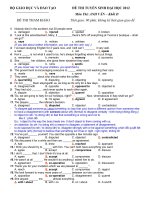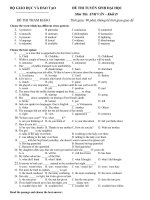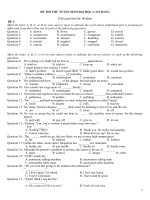Luyện thi ĐH môn Anh văn khối D - Chương trình mới Đề số 16 ppt
Bạn đang xem bản rút gọn của tài liệu. Xem và tải ngay bản đầy đủ của tài liệu tại đây (65.35 KB, 3 trang )
Luyện thi ĐH môn Anh văn khối D - Chương trình mới
Đề số 16
I. Make the correct choice:
1.Choose the word whose underlined part is pronounced differently from the others:
a. gesture b. cruel c. guess d. guest
2.Choose the word whose underlined part is pronounced differently from the others:
a. even b. ever c. never d. essay
3.Choose the word whose underlined part is pronounced differently from the others:
a.table b. vegetable c. acceptable d. comfortable
4.Choose the word whose underlined part is pronounced differently from the others:
a.roofs b. books c. plays d. months
5.Choose the word whose underlined part is pronounced differently from the others:
a.worry b. sorry c. daily d. reply
6. Choose the word whose main stress is placed differently from the others:
a. nationality b. arithmetic c. educational d. graduating
7. Choose the word whose main stress is placed differently from the others:
a. vegetable b. comfortable c. generation d. industry
8. I often feel after the final exams.
a. hurt b. hungry c. shocked d. relaxed
9. Besides language, people can use , facial expressions and eye contact to communicate.
a. gestures b. mouth c. moments d. sights
10. Remember to ask before you a cigarette if you are with a nonsmoker.
a. take up b. get up c. light up d. put up
11. The police are more about breaking the traffic rules.
a. unpleased b. militant c. angry d. busy
12. In this library, there is a for books on science and technology.
a. special section b. section special c. special sections d. sections special
13. I usually feel when I stay at home .
a. alone/ alone b. lonely/ lonely c. alone/ lonely d. lonely/ alone
14. may shake hands when they say hello.
a. business association b. associate business c. business associates d. association business
15. -Where can we meet? -It’s up to you.
a. I do not want to meet you b. I do not know c. It depends on you
d. At your house
16. Peter sometimes has a drink with his friends at the pub.
a. counter b. inn c. shop d. bar
17. -Thank you for a lovely evening. - .
a. You’re welcome b. Have a good day c. Thanks d. cheer
18. They have no of the help.
a. expect b. expectation c. expectancy d. expectant
19. She is more intelligent than I expect.
a. a lot b. many c. a lot of d. no
20. I will give you a call when I ________.
a. will arrive b. arrive c. arrived d. arriving
21. I could not help when I heard the story.
a. to laugh b. laugh c. laughed d. laughing
22. American women may conversations with men or even them to dance.
a. to start/ to ask b. start/ ask c. starting/ asking d. started/ asked
23. late?
a. Did you use to staying up b. Do you used to stay up c. Did you use to stay
up d. Do you use to stay up
24. Although I have stayed in London for a long time, I have not English food.
a. be used to b. get used to c. become accustomed to d. used to
25. Peter used to visit his grandmother, ?
a. used he b. didn’t he c. doesn’t he d. did he
26. American women usually .
a. want to protect b. want being protected c. do not want to be protected d. do not want to
protect
27. No one enjoys being in debt, _____?
a. do they b. don’t they c. does one d. doesn’t one
28. I shall be working _____ office this evening.
a. in b. at c. at the d. to the
29. If I had gone to the party last night, I _____ tired now.
a. would be b. would have been c. have been d. am
30. When my father was young, he was used to walking a long distance, but now he is ______to walk.
a. too old b. young enough c. not old enough d. too young
II.Identify one underlined word or phrase that is incorrect:
31. The novelist has written three novels so far, some years ago he used to have been a teacher.
a b c d
32. Driving on the left side of the road made Lan very surprising when she first visited London.
a b c d
33. Many things used to be done by hand are done by machine now.
a b c d
34. When I was a little girl, I would play with dolls, while my brother preferred than toy cars.
a b c d
35. Unless it did not rain, Peter would pay a visit to us.
a b c d
III. Read the passage and make the correct choice:
Almost every American (36) ______ a watch, and there is a clock in nearly every
room in an American home. “Be on time.” “Don’t waste time.” “Time is money.” “Time waits for no
one.” (37) ______ these familiar sayings reflect the American obsession with promptness and efficiency.
Students and employees displease their teachers and bosses when they arrive (38) ______. This desire to
get the most out of every minute often affects behaviour, (39) ______ Americans impatient when they have to
wait. The pressure to make every moment count sometimes makes it (40) ______for Americans to relax and do
nothing.
36.a. puts b. sets c. wears d. brings
37.a. Most b. All c. Many d. A lot
38.a. late b. lately c. latter d. so far
39.a. causing b. encouraging c. starting d. making
40.a. hardly b. difficult c. possibly d. reasonably
IV. Read the text carefully and then choose the correct answers:
In the 1960’s, the US went through a social revolution commonly referred to as The Women’s Liberation
Movement. One of the goals of this movement was to promote the idea that women are equal to men in their
ability to learn and to succeed in almost any occupation. The movement has benefited women in many ways,
especially in terms of job opportunity and advancement. But it has also created great confusion regarding
manners. Formerly, men were considered the stronger and the dominant sex, so they adopt a protective attitude
toward the so-called weaker sex. That meant helping women on and off with their coats, lighting their cigarettes,
opening doors for them, allowing them to exit from elevators first, and so on. Today, American women do not
consider themselves the weaker sex and do not generally feel in need of male protection. Most men continue to
perform the traditional courtesies, but both sexes are more casual about them. If a man does not help his
girlfriend into or out of her chair in a restaurant, no one will think he is rude.
41. The Women’s Liberation Movement is a .
a. political revolution b. social revolution c. cultural revolution d. economic
revolution
42. One of the goals of this movement was .
a. to promote the idea that women are equal to men on every aspect
b. to promote the idea that women do not need men
c. to promote the idea that women are superior to men
d. to promote the idea that women are the stronger sex
43. The Women’s Liberation Movement .
a. has no effect on women b. has no effect on men
c. makes women uncomfortable d. provides women with benefit
44. In former days, .
a. men paid no attention to women b. men regarded women as the lower class
c. men adopted a protective attitude toward women d. men were equal to women
45. If a man does not help his girlfriend into or out of her chair in a restaurant .
a. he is considered to be rude b. he is not thought to be rude
c. he is polite d. he is impolite
V. Choose the correct sentence which has the same meaning as the above one :
46. Please do not stop your work.
a. Please work nonstop b. Please go on with your work
c. please put a stop to your work d. please carry out your work now
47. Julia didn’t listen to what her doctor told her.
a. What the doctor told Julia wasn’t worth listening to b. Julia couldn’t hear what the doctor told her
c. The doctor told Julia to listen to him d. Julia took no notice of what the doctor told her
48.It was a long time ago when I saw a movie.
a. I spent a long time looking for a movie to see b. I have seen some movies so far
c. I have seen a number of movies lately d. It is a long time since I saw a movie
VI. Choose the best sentence made from the given cues:
49. young people / fed / queue / unemployment benefit.
a. Young people fed with queuing for their unemployment benefit.
b. Young people are fed with queuing for their unemployment benefit.
c. Young people are fed up with queuing for their unemployment benefit.
d. Young people have fed up with queuing for their unemployment benefit.
50. If / you / not help / I / not meet her / last week.
a. If you hadn’t helped me, I wouldn’t meet her last week.
b. If you didn’t help me, I wouldn’t meet her last week.
c. If you hadn’t helped me, I wouldn’t have met her last week.
d. If you didn’t help me, I wouldn’t have met her last week.









